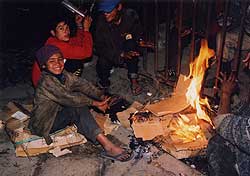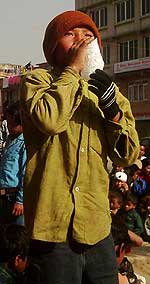 It's late night at Putali Sadak. The busy street is quiet and the good citizens of the capital have gone home to sleep. But this is the best time of day for Bhim Pariyar and his friends-no policemen, no shop-keepers or taxi drivers to harass them.
It's late night at Putali Sadak. The busy street is quiet and the good citizens of the capital have gone home to sleep. But this is the best time of day for Bhim Pariyar and his friends-no policemen, no shop-keepers or taxi drivers to harass them. Under the ghostly yellow glow of the halogen lamps, they make a bonfire of cardboard boxes and huddle around the flames for their favourite pastime: listening to Bhim spin stories of impossible exploits. He is the 10-year-old prince of Putali Sadak's rag world, and the richest among his peers. He makes an enviable Rs 400 a day selling plastic.
It's almost 9PM now, time for Bhim, the youngest and most hard-working in the group, to scour the dirty innards of Kathmandu to find recyclable rubbish. "There's no competition at night because all the others are asleep," says Bhim. With a headphone over his head and a walkman tied securely to his waist ("You don't really want to know how I got this," he says with a laugh), he walks into the dark while his friends spread their thin blankets on the pavement. "That one's crazy, I wonder why he works so hard," says one of his friends.
"I wish I was home even if it meant living with my cruel stepmother and father," says 14-year-old Rajen Subba who ran away from his home in Kakaribhitta. He has been living on the streets since he was eight, and believes it's too late for him to go home now. Rajen is weak, having recently recovered from a severe chest infection. Now, living in the cold with no warm clothing and little food to eat, Rajen seeks escape from the cold and loneliness by inhaling fumes from carpet glue that has been squeezed into an old milk bag. The adhesive contains toluene, a sweet-smelling neurotoxic hydrocarbon, which depresses the appetite and takes the edge off the winter.
 "I forget everything. I won't feel cold and hungry and can sleep easily," Rajen explains. The nuerotoxin dissolves the cell membrane of the brain cells and also causes hallucinations. "Last night, I saw one god but don't remember which one," Milan Tamang, 14, jokes with his friends. "I got so furious when I couldn't see anything last night," says Rabi Gurung, 16. He is admired in his circle for his addiction to glue.
"I forget everything. I won't feel cold and hungry and can sleep easily," Rajen explains. The nuerotoxin dissolves the cell membrane of the brain cells and also causes hallucinations. "Last night, I saw one god but don't remember which one," Milan Tamang, 14, jokes with his friends. "I got so furious when I couldn't see anything last night," says Rabi Gurung, 16. He is admired in his circle for his addiction to glue. Sniffing glue is a short 'trip' with an immediate high. The pleasure is temporary, and the children are unaware that sniffing causes permanent neurological damage, kidney or liver failure, paralysis and even death. A report last year by the child welfare organisation, CWIN, found that nearly 95 percent of all Kathmandu street children were hooked to glue. Researchers found some children use as many as 15 tubes a day-a single tube can last five sessions.
The cheapest glue is made in Nepal and is easily available in all hardware shops. A tube costs anywhere between Rs 20-40 for 25mg. "I was really surprised by the number of street children coming to buy carpet dendrite from my shop, now I know," says Ramesh Shrestha who owns a shop in Jawalakhel.
"The government should make it illegal to sell the dendrites to minors," says activist Sumnima Tuladhar of CWIN. CWIN and another group, Sath-Sath, organised an awareness workshop for shopkeepers with Kathmandu Valley Police but this hasn't lead to a decrease in the problem. Some shopkeepers increased the price of glue to discourage the children, but the demand is too high. There is also a lack of in-depth research and no longterm study of the health problems faced by users. "This is an emerging problem. If we don't take it seriously, then a lot of lives will be at stake," says Biso Bajracharya of Sath-Sath.
A surprising number of activist groups working for child rights contacted during the research into this article seem unaware of the epidemic. Kathmandu Valley Police has paid serious attention, but since glue sniffing is not considered illegal they have problems in controlling shops that sell glue to children. "The best we can do is raise awareness among shop owners and the street children," says Assistant Sub-Inspector Salina Gurung from Valley Police Women's Cell.
Sniffing glue is relatively new to Nepal but is rampant in Latin America, Southeast Asia, South Africa and now in South Asia. According to reports, out of 40 million street children in Latin America, more than half sniff glue. Their numbers are rising in Thailand, Indonesia, Cambodia, Malaysia, Pakistan, India and the Philippines, which has the largest population of street children.
One country has dared to take extreme measures to control the trend: Kenya. In Nairobi this year the government criminalised the supply of harmful substances to minors as well as child glue addicts. The new law states any person found distributing such substances faces three years incarceration.
Here in Nepal, the trend is leaving the streets and entering schools. "It's time for us to take this issue seriously because the trend is spreading to classrooms," says Bajracharya who has seen students sniffing glue on the premises of a private high school in Lalitpur. "We found a lot of school girls are pasting glue onto their ties and sniffing it during class," says Tuladhar.
The immediate danger to glue addicts on the streets is being run over by cars. Recently, a teenager jumped from a bridge and broke his leg. He did not know what he was doing. Another 10-year-old boy walked straight into a motorcycle and nearly died. A 14-year old girl was cut in a traffic accident.
Nepal's basic drug law is the Narcotic Drugs (Control) Act, 2033 (1976), under which 'the cultivation, production, preparation, manufacture, export, import, purchase, possession, sale or consumption of most commonly abused drugs' is illegal. The Narcotic Drug Control Act, amended in 1993, implements most of the UN Single Convention and the 1972 Protocol by addressing narcotics production, manufacture, sales, import and exports. In association with the United Nations Drug Control Program (UNDCP), Nepal has developed a master plan for drug abuse control.
While all this legalese looks good on paper, what Bhim Pariyar and his friends on Putali Sadak need this holiday season is a little kindness, a lot of awareness and a chance of rehabilitation.


